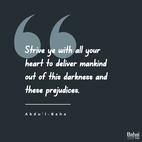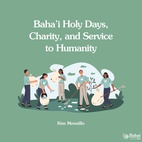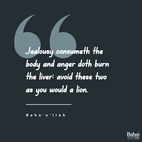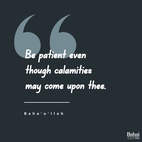The views expressed in our content reflect individual perspectives and do not represent the official views of the Baha'i Faith.
Conscience is a thousand swords. – Shakespeare
There is a higher court than courts of justice and that is the court of conscience. It supersedes all other courts. – Gandhi
There comes a time when one must take a position that is neither safe, nor politic, nor popular, but he must take it because conscience tells him it is right. – Martin Luther King Jr.
When did your last crisis of conscience happen? Large or small, we all have them. You face a tough decision, and that still small voice inside your soul says “Wait a minute. Am I doing the right thing?”
When your conscience asks you that question, it might be about something minor, something seemingly unimportant; or it might be the most important decision of your entire life.
A friend of mine told me about her recent little crisis of conscience—a vegetarian for years, she had breakfast in a restaurant with her sister, and her sister ordered eggs and bacon. “That bacon on my sister’s plate smelled so good I just could not resist. It was so good, but eating it made me feel terrible,” she said. In response, I had to tell her the old joke about the difference between eggs and bacon: the chicken was involved, but the pig was committed. (In hindsight, however, I suspect that didn’t make her feel any better.)
At the other end of the seriousness spectrum from my friend’s relatively minor crisis, the hundreds of thousands of refugees now pouring into Europe from Syria have generated a major crisis of conscience for millions of Europeans and their governments. As I write this today, Pope Francis just told a joint session of the American Congress that “We must not be taken aback by their numbers, but rather view them as persons, seeing their faces and listening to their stories, trying to respond as best we can to their situation.” This good advice—that a crisis of conscience should always first consider the human beings involved—resonates powerfully with the Baha’i teachings:
O ye beloved of the Lord! The Kingdom of God is founded upon equity and justice, and also upon mercy, compassion, and kindness to every living soul. Strive ye then with all your heart to treat compassionately all humankind… – Abdu’l-Baha, Selections from the Writings of Abdu’l-Baha, p. 158.
This short quote from the Baha’i teachings gives us three clear, specific guidelines for dealing with any crisis of conscience:
- Equity and Justice;
- Mercy and kindness;
- Treat compassionately all humankind.
When you’re having a crisis of conscience, and trying to answer a hard moral question, first ask yourself: What’s fair and just? How could I be most equitable here?
 I learned about justice and equity from my mother, who had a terrific way of showing us fairness—when I was a child, and my little brother and I got a treat, we would usually have to split it. A brownie, a candy bar, a banana—no matter what it was, it needed to be shared fairly and equitably. Mom’s rule: one person cuts it in half, the other one chooses. I guarantee it—you’ve never seen such precise and careful measuring. Since I was usually the one to divide the treat, and my brother got to choose first, I made sure each half perfectly reflected the other half. Try it: one cuts, the other chooses.
I learned about justice and equity from my mother, who had a terrific way of showing us fairness—when I was a child, and my little brother and I got a treat, we would usually have to split it. A brownie, a candy bar, a banana—no matter what it was, it needed to be shared fairly and equitably. Mom’s rule: one person cuts it in half, the other one chooses. I guarantee it—you’ve never seen such precise and careful measuring. Since I was usually the one to divide the treat, and my brother got to choose first, I made sure each half perfectly reflected the other half. Try it: one cuts, the other chooses.
Once you’ve determined the fairness of the situation, you can begin to apply a liberal personal dose of mercy and kindness. Most crises of conscience are driven not only by questions of justice, but also by questions of kindness. Ask yourself: how could I best respond to this crisis of conscience and act with the most mercy and kindness? This step encourages everyone to consider, when their crisis of conscience comes, the effects their decision will have on the others around them. Our minds all want fairness, but our hearts and souls want love and kindness even more.
One person I know recently faced a crisis of conscience when he had to decide how to respond to an insult. He heard from a third party that a friend—or at least someone he had thought of as a friend—had said something negative about him. He knew that the just and equitable path involved going directly to that friend and asking him about it, but he felt that a direct confrontation would only make things worse—and compromise the one who told him about the insult. So he decided, in the interests of tempering justice with mercy and possibly sustaining the friendship, to increase his efforts to be kind toward his backbiting friend. After a month of that effort, without ever mentioning it, he received an unsolicited apology for the insult, and knew he had made the right decision.
Then, finally, you can consider how your crisis of conscience will reflect the virtue of compassion toward all humankind.
This initially sounds similar to the second decision-making step, with its focus on mercy and kindness, but factoring in compassion toward all involves another, even higher level of consideration. Compassion means deep sympathy, and that emotion allows us to put ourselves in the place of others and then contemplate the long-term results on humanity, on posterity and on the planet. With the third, compassionate step, the Baha’i teachings ask us to consider the impact of our conscience and its decisions on the whole world—to become world-minded.
Here’s a simple example: I have a friend who needed a new car, and after discussing it he realized he had to balance his desire for something fast, low and red with his desire for a livable future for the world’s children. He faced a crisis of conscience between his own warring desires. He wound up with something in between—shiny and red, but also with a very low impact on the environment. That choice, he told me, he saw as the most compassionate toward future generations.
Everyone has decisions to make, and we all have to factor in the impact of our conscience on those decisions. If you use this simple three-step tool to make your moral choices—justice, kindness and compassion for all humanity—it will transform those decisions into ones truly congruent with your innermost values.

















Comments
Sign in or create an account
Continue with Facebookor